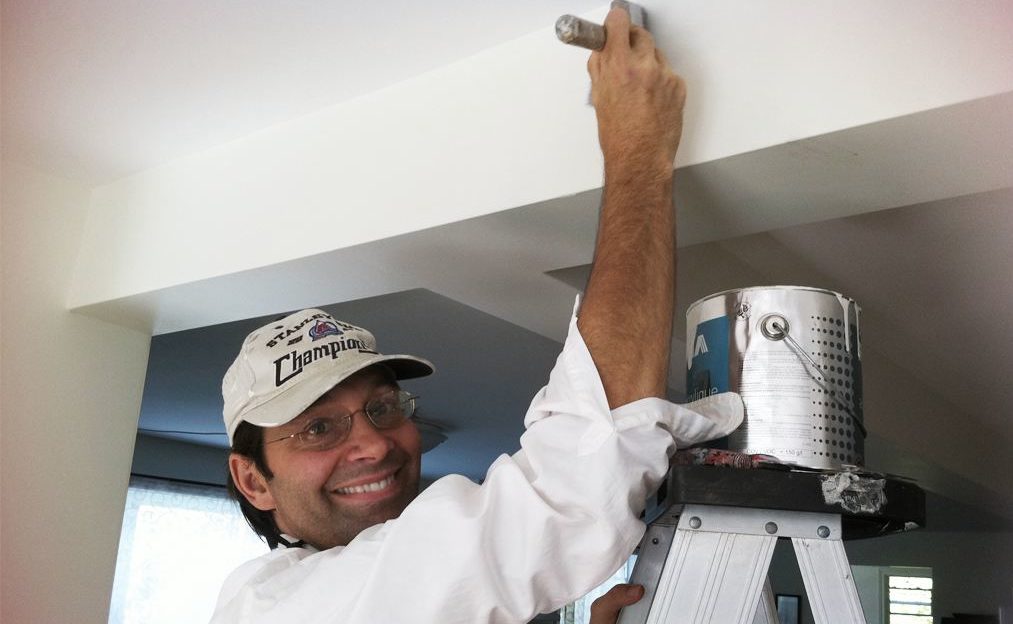In this second article, I tell you the inside story of what the painter is thinking while he’s calculating your price and doing your work.
In the first article, I tell you how to be wise when you hire a painter.
In the third article, I discuss whether or not you should hire a painter at all.
Now that I’m retired, here is my advice to all of you who maybe be DIY painters.
Do all you can yourself, but don’t ask to work alongside the pros when they get there.
My paint store manager buddy told me how some nefarious painters buy expensive paints such as Ben Moore or Sherwin Willimas paint for one job, carefully clean the cans and for the next job buy some budget hardware paint store brand (far less quality) and dump it in the expensive looking buckets.
Since they are charging you for paint, you lose. Ask for the paint store receipts for your records. It will have the dates, color numbers, and number of gallons.
Written Estimate?
The painter who first trained me always worked on ‘a handshake’, giving his word as his guarantee.
He worked in the community where he lived and raised his children.
I also did that for years but then found that a paper estimate was important. My word was always my guarantee. I had only one unsatisfied customer in 30 years, and that was due to a very weird personal problem that she has, I later learned.
Bad paints make painters look bad.
Don’t buy the paint before you hire a painter. I never took a job when the paint was already there unless it was Ben Moore or another top-quality paint. Ask what paint they prefer. If they say Glidden, kick them right out! If they know quality paint matters, they do quality work.
Look for honesty about how they make money.
I was always upfront about my money. “I work a 6-hour day and for that day I charge $250. This job will take 3 days so the labor will be 750.”
If I’m too expensive, hire the painter who’s living in his mother’s basement!
Pros have to put away money every week for retirement being self-employed.
Big or small company: the sweet spot:
Larger painters have accountants, secretaries, etc. Overhead is costly, so look for a painter who has been in the game for many years and works alone or with one or two other painters.
Contract details
Never hire any contractor on an hourly basis. That is fine for work you add later, like an extra door or something, but get the figure up front. Get an assurance in writing that that will not change in any case. In rare cases, if the painter discovers that, let’s say some wall is soaking wet and moldy and cannot be painted, yes, you have to re-negotiate. It’s only fair. But if you go hourly you are asking for a legal nightmare.
Tipping Point: make him/her take this quiz.
Finally, ask this question in your interview.
“If you have some oil-based surface, can you paint over it with oil-based paint? How do you handle that?”
The correct answer is here: no, you cannot. Latex over oil or even re-applying oil over oil requires de-glossing old oil with sandpaper or a liquid deglosser. Otherwise it just won’t bond.
Even with the newest greatest bonding primers, it’s trouble.
Or ask your paointer this: “Are reds and yellows the same as any other paint?” NO! They are awful to get good coverage. Always prime for them with gray primer.
Exterior projects needing scraping and sandeing, etc, get the painter to show you an example of how the prep will look before it is primed.
Prep is hard work and painters will cut corners because as Mark Twain said (or someone said), “a coat of paint can hide a multitude of sins”.
Document every promise.
What is the plan for the number of coats per surface for both primer and paint?
No paint chips should be left around the area.
Where will they use the toilet?
Let me know if you have a question.
